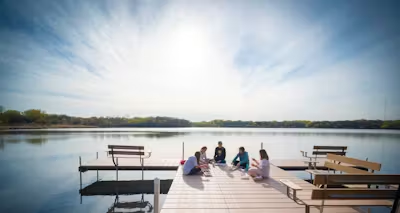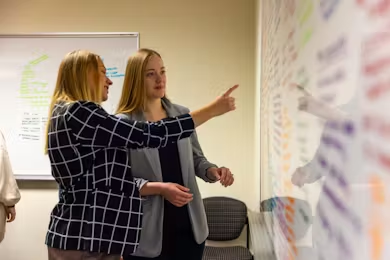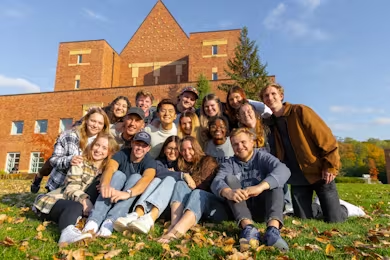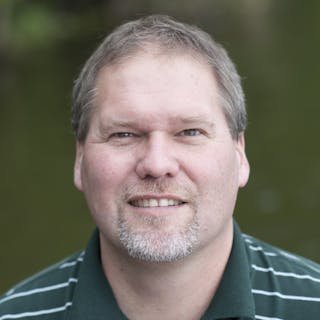


Become who you’re meant to be. While earning a B.S. in Environmental Science, you’ll forge a strong foundation in the biological sciences and be introduced to scientific, political, ethical, and historical perspectives on the environment. You’ll learn in an interdisciplinary core of courses, and you’ll be equipped for graduate school and many careers. You’ll reach your full potential so you can go into the world to serve.
Contact us
Request info
Interested in learning more about Bethel's B.S. in Environmental Science program? Fill out this simple form and we'll send you more information soon.
Connect with a counselor
They’ll answer your questions, connect you with professors, and help you find the right time to visit campus. They’ll be there every step of the way to help make applying to Bethel as smooth as possible.
Courses and skills
What skills will I develop?
By majoring in environmental science, your education will focus on the identification and solution of environmental problems and on moving our society toward environmentally sustainable patterns of living. You’ll build a strong foundation for a vibrant career serving others and our world.

A strong science foundation
You’ll build a strong core foundation of ecology and biology you will gain in Bethel's biology department and apply lessons through experiences on and off campus.
Amazing partnerships
Partnerships with other disciplines at Bethel and with Au Sable Institute will help you learn to think holistically from an interdisciplinary approach. And these will provide numerous opportunities to take a variety of courses on- and off-campus.
Strong scientific skills
You’ll learn to ask and answer challenging questions, explore quantitative data, develop your observational, and expand critical thinking skills as you learn how to live sustainably in a complex world.
Research and presentation
As you pursue research opportunities, you’ll develop strong writing and research capabilities in environmental studies fields. And you’ll have the chance to present ideas both in writing and orally.
Environmental monitoring
In amazing labs on campus and through off-campus experiences, you’ll learn how to test water quality, monitor bird and mammal populations, and use Geographic Information System software.

Academic plans
Map out your time at Bethel—from day one to your diploma. Your course schedule is designed to help you grow, gain skills, and become who you’re meant to be.
Learning opportunities
What experiences will I have?
Hands-on learning is at the core of all Bethel majors. That means you’ll find numerous opportunities to get involved, apply what you’ve learned, and gain experience. You’ll also be able to participate in clubs like the Creation Restoration Club, Tri-Beta National Biology Honor Society, and more. And Bethel’s size and vibrant community will allow you to pursue ways to get involved right away.

State-of-the-art labs
Our well-equipped spaces provide quick access to our beautiful 247-acre campus for research and study. Herbarium, invertebrate, and bird collections allow you to experience amazing organisms. You'll also work in vivariums, aquatic facilities, a greenhouse, walk-in environmental chambers, and a soil research lab.

Study abroad
Study in places as diverse as Ecuador, New Zealand, and Michigan or Washington through Au Sable Institute. These opportunities are built into the major, maximizing the college credit you can receive toward your degree.

Practical experience
In addition to paid campus positions like animal caretaking or greenhouse maintenance, you’ll have the chance to gain experience through internships at rehabilitation centers, zoos, environmental testing laboratories, and state, federal, and private conservation agencies.
Real-world impact
What can I do with an environmental science degree?
As you study environmental science, you’ll gain the skills to address the most pressing, challenging human-environment interactions in a variety of careers. It’s all to help you become the person you’re meant to be and become equipped for a life of purpose in almost any field.
Environmental monitoring and restoration
You’ll be equipped for a career in roles tied to conservation biology, natural resource monitoring and protection, and ecological restoration.
Creation care roles
Work in roles tied to caring for God’s creation through jobs tied to renewable energy, aquatic system quality, water treatment, and resource recovery.
Zoological and wildlife care
Follow in the footsteps of many graduates who work at zoos, in wildlife biology, park/preserve management, and much more.
Education and teaching
You’ll be equipped to earn additional licenses or degrees to become a biology teacher or pursue an education career. And many graduates work in education roles at parks or zoos.

Start your journey
Explore Bethel for yourself
Visiting campus is the best way to learn about Bethel and our majors. As you try out academic and campus life at Bethel, you can attend a class, chat with students, meet professors and coaches, tour campus, and get a taste of life in our program.
Faculty mentors
Meet your professors
You’ll learn alongside faculty who are distinguished scholars and faithful Christians. They’ll know you by name and invest in your success. Professors are accessible between classes, and you’ll often find fellow students gathered or studying in our department lounge.
Student Support
Your support team
At Bethel, you’ll experience a community where you belong. And that means you’ll be able to access numerous tools for your academic success—tutoring, mentors, study help, and more.

Career coaching and preparation
A dedicated team is here to empower you to lead a purposeful life. Career coaches will help you build a resume, pursue internships and jobs, and provide support at every step of the way.

Academic advising
No matter your goals, you’ll find support from your advisor. They’ll help you plan your courses and will provide support as you complete your degree and start a successful career.

Tutoring and academic support
The Academic Enrichment and Support Center (AESC) will be your first stop for academic support. You’ll find help in building study skills, academic counseling, and more.

Faith formation
As you develop your faith, you’ll have support from our Campus Ministries team. From Chapel to Bible studies, you’ll have numerous opportunities to explore and grow in your faith.

A path with promise
Clear price. Clear outcomes.
Know what your education costs—and where it’s taking you. You’ll start with a clear price so you can focus on what truly matters: your education and your future. And you’ll graduate with confidence through the Bethel Career Commitment, which includes built-in career coaching and additional support for eligible graduates who still need help.

Become A Bethel Student
Apply now
You belong at Bethel. If you're ready to see who you could become, start your free application today.
Find your fit
Explore related programs
Bethel’s small size, strong community, and liberal arts focus allows you to personalize your education by adding additional majors or minors. In fact, about 30% of students double major—and many pursue degrees in vastly different disciplines.



Explore the full lists:



















